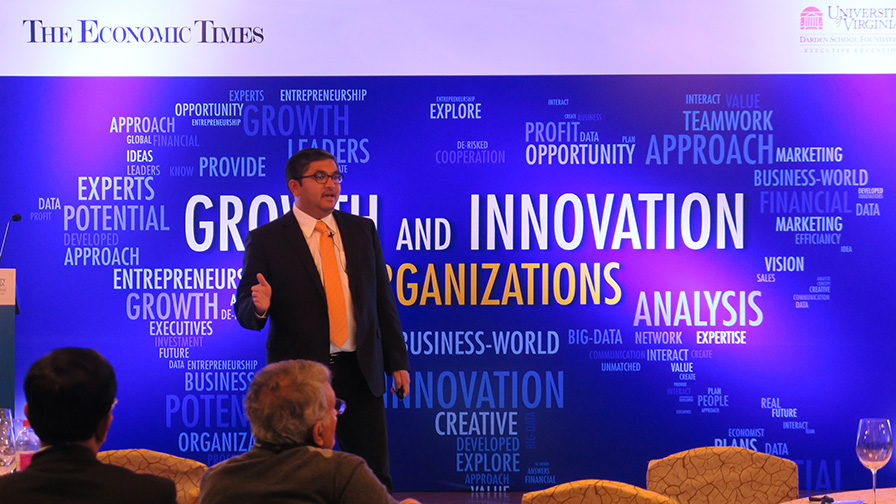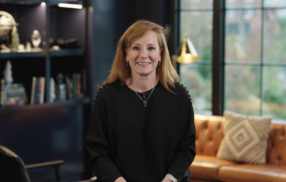
UVA Darden Studies Organizations, Contrasts and Entrepreneurial Spirit in India
By Julie Daum
The University of Virginia Darden School of Business hosted a series of programs and events in India in early January that connected the School to leading companies and top executives in the world’s second most populous country.
A Study in Contrasts
During a two-week residency in Mumbai and Delhi, students in Darden’s Global Executive MBA (GEMBA) Class of 2017 took core courses in strategy, marketing, operations and decision analysis and studied real-life cases about local companies, including Coca-Cola India, Oberoi Group and The Times of India — and met with their leaders.
In Mumbai, leaders from the Oberoi Group, a global hotel company, shared insights into the luxury service sector. On the hot topic of demonetization in India, in which the government created disruption throughout the economy by suddenly announcing the demonetization of old 500 and 1000 rupee bank notes, a panel of leading bankers in India discussed what it will take to inspire the unbanked to bank their money.
In Delhi, Venkatesh Kini, president of Coca-Cola India and Southwest Asia, described the Indian business landscape as “a study in contrasts,” and explained how Coca-Cola is tapping into the huge potential of India’s mass market.
In an environment in which Coca-Cola competes against chai tea and freshly squeezed lemon juice sold on the street for as little as 5 rupees, “The most important thing to ensure success in India is to attain a magic price point with the same product that has global quality,” said Kini.
As literacy rates increase across the country, Priank Mathur, general manager of corporate strategy, performance management and brand management at The Times of India, described a media landscape in which print continues to grow at 8 percent — despite the onslaught of the digital age. A journalist from NPR India provided the broadcast perspective.
Direct interaction with global leaders is a hallmark of the GEMBA program, which uses an immersive learning approach to develop skills that allow executives to thrive in any business situation around the world.
“Through five global residencies in China, India, Brazil, Western Europe and the United States, executives in the Class of 2017 are learning to assess a region’s business environment and how culture embraces or intercepts the natural business flow,” said Larry Mueller, assistant dean of the GEMBA program.
Growth and Innovation in Organizations
Meanwhile, Darden Executive Education, in collaboration with The Economic Times, hosted an executive roundtable on the topic, Building the Innovation Machine. Leaders of top Indian corporations joined Darden Professors Saras Sarasvathy and Raj Venkatesan for a dynamic discussion at the Taj Mahal Hotel Mansingh in Delhi.
Venkatesan speculated on why companies across the globe are not getting sufficient value out of their analytics. He shared his research on big data — proving that few companies are using it — and explained how to unleash its potential for innovation, citing examples of leading practitioners like Netflix and Zillow.
Darden Professor Saras Sarasvathy described her groundbreaking research on the entrepreneurial logic known as effectuation, which paves the way for leaders to create and thrive amid uncertainty.
In a world of disruption, Sarasvathy pointed to the financial technology industry in India as an example of how to create the future against a backdrop of unknowns. For example, the upstart Paytm has taken off. Now India’s largest mobile commerce and payment system platform, Paytm’s mobile apps are used by consumers to make payments to retailers, travel companies and even roadside vendors.
Venkatesan and Sarasvathy continued their discussions of growth and innovation in organizations at a second event, which convened a wide audience, including Indian business leaders and Darden alumni.
Thriving Entrepreneurial Spirit
Darden residential MBA students also joined the events in India, digging deeper into the challenges of doing business in this developing country. The course to India is one of more than two dozen Darden Worldwide Courses offers to MBA students. The Indian course explored data science and technology and the role these disciplines play. Students visited organizations such as Nasscom’s Startup Warehouse and Walmart e-commerce.
“I think the biggest takeaway for students was the opportunity to see India’s thriving entrepreneurial spirit and to gain a better understanding of the complexity of demographics throughout the country — a country that is ranked 130th in terms of ease of doing business,” said Professor Casey Lichtendahl, faculty lead for the course.
Read the Global Voices of Darden blog for more.
The University of Virginia Darden School of Business prepares responsible global leaders through unparalleled transformational learning experiences. Darden’s graduate degree programs (MBA, MSBA and Ph.D.) and Executive Education & Lifelong Learning programs offered by the Darden School Foundation set the stage for a lifetime of career advancement and impact. Darden’s top-ranked faculty, renowned for teaching excellence, inspires and shapes modern business leadership worldwide through research, thought leadership and business publishing. Darden has Grounds in Charlottesville, Virginia, and the Washington, D.C., area and a global community that includes 18,000 alumni in 90 countries. Darden was established in 1955 at the University of Virginia, a top public university founded by Thomas Jefferson in 1819 in Charlottesville, Virginia.
Press Contact
Molly Mitchell
Senior Associate Director, Editorial and Media Relations
Darden School of Business
University of Virginia
MitchellM@darden.virginia.edu




